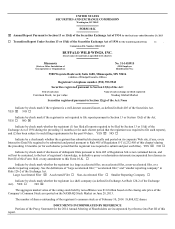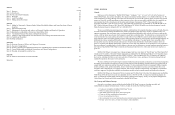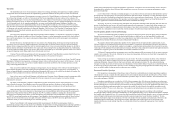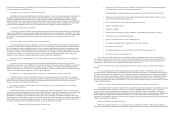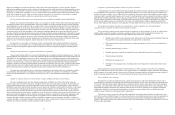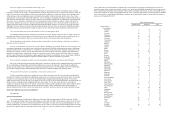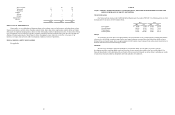Buffalo Wild Wings 2013 Annual Report Download - page 7
Download and view the complete annual report
Please find page 7 of the 2013 Buffalo Wild Wings annual report below. You can navigate through the pages in the report by either clicking on the pages listed below, or by using the keyword search tool below to find specific information within the annual report. 12
Shortages or interruptions in the availability and delivery of food and other supplies may increase costs or reduce
revenues.
Possible shortages or interruptions in the supply of food items and other supplies to our restaurants caused by inclement weather,
terrorist attacks, natural disasters such as floods, drought and hurricanes, pandemics, the inability of our vendors to obtain
credit in a tightened credit market, food safety warnings or advisories or the prospect of such pronouncements, or other
conditions beyond our control could adversely affect the availability, quality and cost of items we buy and the operations of our
restaurants. Our inability to effectively manage supply chain risk could increase our costs and limit the availability of products
critical to our restaurant operations.
We may experience higher-than-anticipated costs associated with the opening of new restaurants or with the closing,
relocating, and remodeling of existing restaurants, which may adversely affect our results of operations.
Our revenues and expenses can be impacted significantly by the location, number, and timing of the opening of new
restaurants and the closing, relocating, and remodeling of existing restaurants. We incur substantial pre-opening expenses
each time we open a new restaurant and incur other expenses when we close, relocate, or remodel existing restaurants. These
expenses are generally higher when we open restaurants in new markets, but the costs of opening, closing, relocating or
remodeling any of our restaurants may be higher than anticipated. An increase in such expenses could have an adverse effect
on our results of operations.
A security failure in our information technology systems could expose us to potential liability and loss of revenues.
We accept credit and debit card payments in our restaurants. A number of retailers have recently experienced actual or
potential security breaches in which credit and debit card information may have been stolen, including a number of highly
publicized incidents with well-known retailers. The intentional, inadvertent or negligent release or disclosure of data by our
company or our service providers could result in theft, loss, fraudulent or unlawful use of customer data, could harm our
reputation and result in remedial and other costs, fines or lawsuits.
We are required to maintain the highest level of Payment Card Industry (“PCI”) Data Security Standard compliance at our
company-owned restaurants and corporate offices due to the number of credit card transactions processed in in our company-
owned restaurants. Failure to maintain our PCI compliance could result in fines or even prohibit our use of payment cards in our
company-owned restaurants. While our franchisees are separate businesses, and therefore are subject to different levels of PCI
compliance, any failure by our franchisees to maintain their required level of PCI compliance could harm our reputation or result
in loss of future royalties.
Our restaurants may not achieve market acceptance in the new domestic and international geographic regions we
enter.
Our expansion plans depend on opening restaurants in new domestic and international markets where we or our
franchisees have little or no operating experience. We may not be successful in operating our restaurants in new markets on a
profitable basis. The success of these new restaurants will be affected by the different competitive conditions, consumer
tastes, and discretionary spending patterns of the new markets as well as our ability to generate market awareness of the
Buffalo Wild Wings® brand. Sales at restaurants opening in new markets may take longer to reach profitable levels, if at all.
New restaurants added to our existing markets may take sales from existing restaurants.
We and our franchisees intend to open new restaurants in our existing markets, which may reduce sales performance
and guest visits for existing restaurants in those markets. In addition, new restaurants added in existing markets may not
achieve sales and operating performance at the same level as established restaurants in the market.
Investments in new or emerging brands may not be successful.
We have a minority investment in PizzaRev, a fast-casual pizza restaurant, and intend to invest in additional emerging
restaurant brands in the future as additional vehicles of growth. If these emerging brands do not succeed, we risk losing all or
a substantial portion of our investment in those brands. In addition, our overall long-term growth may be affected by the level
of success achieved by these restaurant concepts.
13
Failure of our internal controls over financial reporting could harm our business and financial results.
Our management is responsible for establishing and maintaining effective internal control over financial reporting.
Internal control over financial reporting is a process to provide reasonable assurance regarding the reliability of financial
reporting for external purposes in accordance with accounting principles generally accepted in the United States. Because
of its inherent limitations, internal control over financial reporting is not intended to provide absolute assurance that we
would prevent or detect a misstatement of our financial statements or fraud. Any failure to maintain an effective system of
internal control over financial reporting could limit our ability to report our financial results accurately and timely or to detect
and prevent fraud. A significant financial reporting failure or material weakness in internal control over financial reporting
could cause a loss of investor confidence and decline in the market price of our stock.
Economic conditions could have a material adverse impact on our landlords or other tenants in retail centers in
which we or our franchisees are located, which in turn could negatively affect our financial results.
Our landlords may be unable to obtain financing or remain in good standing under their existing financing
arrangements, resulting in failures to pay required construction contributions or satisfy other lease covenants to us. In
addition other tenants at retail centers in which we or our franchisees are located or have executed leases may fail to open
or may cease operations. If our landlords fail to satisfy required co-tenancies, such failures may result in us or our franchisees
terminating leases or delaying openings in these locations. Also, decreases in total tenant occupancy in retail centers in which
we are located may affect guest traffic at our restaurants. All of these factors could have a material adverse impact on our
operations.
An impairment in the carrying value of our goodwill or other intangible assets could adversely affect our financial
condition and consolidated results of operations.
Goodwill represents the excess of cost over the fair value of identified net assets of business acquired. We review
goodwill for impairment annually, or whenever circumstances change in a way which could indicate that impairment may
have occurred. Goodwill is tested at the reporting unit level. We identify potential goodwill impairments by comparing the
fair value of the reporting unit to its carrying amount, which includes goodwill and other intangible assets. The fair value
of the reporting unit is calculated using a market approach. If the carrying amount of the reporting unit exceeds the fair
value, this is an indication that impairment may exist. We calculate the amount of the impairment by comparing the fair value
of the assets and liabilities to the fair value of the reporting unit. The fair value of the reporting unit in excess of the value of
the assets and liabilities is the implied fair value of the goodwill. If this amount is less than the carrying amount of goodwill,
impairment is recognized for the difference. A significant amount of judgment is involved in determining if an indication of
impairment exists. Factors may include, among others: a significant decline in our expected future cash flows; a sustained,
significant decline in our stock price and market capitalization; a significant adverse change in legal factors or in the
business climate; unanticipated competition; the testing for recoverability of a significant asset group within a reporting unit;
and slower growth rates. Any adverse change in these factors would have a significant impact on the recoverability of these
assets and negatively affect our financial condition and consolidated results of operations. We compute the amount of
impairment by comparing the implied fair value of reporting unit goodwill with the carrying amount of that goodwill. We are
required to record a non-cash impairment charge if the testing performed indicates that goodwill has been impaired.
We evaluate the useful lives of our intangible assets to determine if they are definite- or indefinite-lived. Reaching a
determination on useful life requires significant judgments and assumptions regarding the future effects of obsolescence,
demand, competition, other economic factors (such as the stability of the industry, legislative action that results in an
uncertain or changing regulatory environment, and expected changes in distribution channels), the level of required
maintenance expenditures, and the expected lives of other related groups of assets.
We cannot accurately predict the amount and timing of any impairment of assets. Should the value of goodwill or other
intangible assets become impaired, there could be an adverse effect on our financial condition and consolidated results of
operations.
We are dependent on franchisees and their success.
Currently, approximately 56% of our restaurants are franchised. Franchising royalties and fees represented
approximately 6.4%, 7.4%, and 8.6% of our revenues during fiscal 2013, 2012, and 2011, respectively. Our performance
depends upon (i) our ability to attract and retain qualified franchisees, (ii) the franchisees’ ability to execute our concept and
capitalize upon our brand recognition and marketing, and (iii) franchisees’ ability to timely develop restaurants. We may not
be able to recruit franchisees who have the business abilities or financial resources necessary to open restaurants on schedule,

